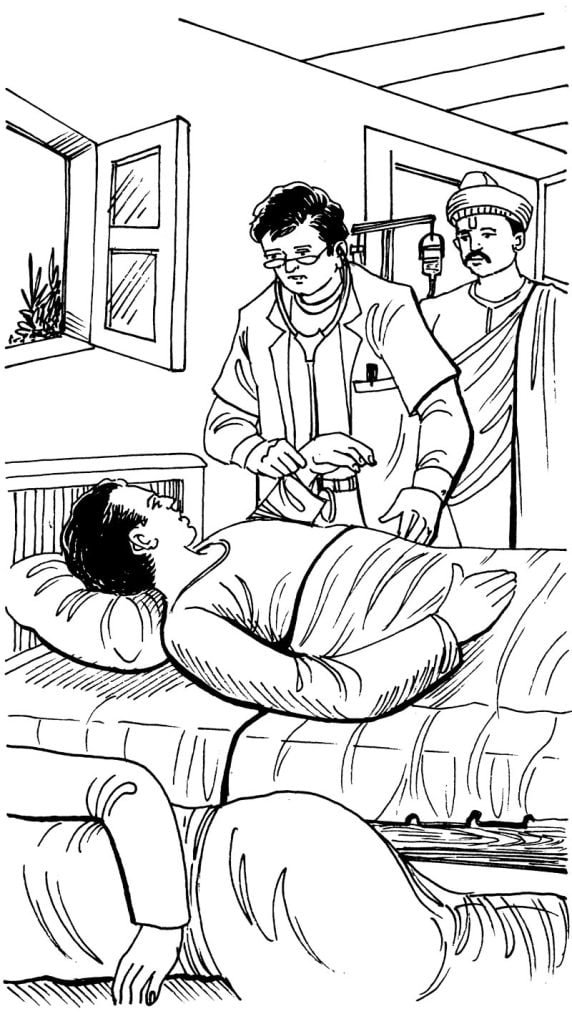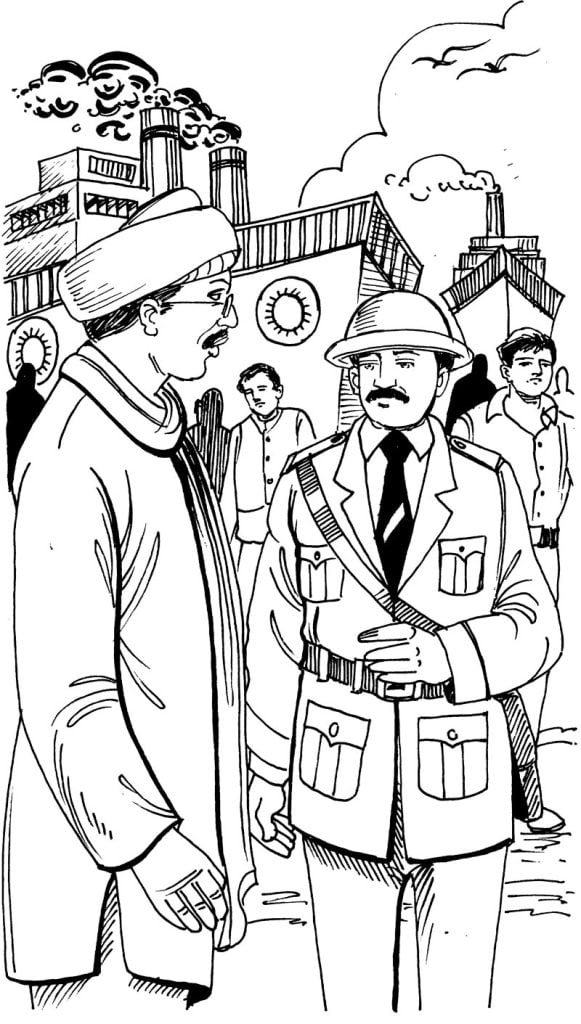The British government of India was spending money on things other than the welfare of India. With that revenue the government was playing its games of imperialist expansionism.
To expand the British empire the wars were being fought in Afghanistan and Burma (Myanmar) with Indian revenue. India was suffering droughts and famines in several states. The British authorities were cooking up documents to show that there was no famine and drought anywhere in India whereas thousands of people were dying unaccounted for.
The revenue officials were descending on the drought hit villages to collect revenues or to attach the properties of helpless farmers in case of non-payment. No help or relief was being provided to famine hit masses. They were allowed to die of starvation taking it as God’s act of punishment against their barbarianism.

Only on expansionist drives British spent 115 crores of Indian revenue, and not from British treasure of London. The British government was keeping a large Indian army without any proper need and the Indian tax payers were being made to finance that luxury. Thus, the colonial rulers were impoverishing the masses and building up their own power of possible repression on the same masses.
During the year of 1893, the European employees of the empire stationed in India were getting the exchange allowance, one of the many ways of doling out money to foreigners at the cost of the revenues of India.
Gokhale presented all these facts and the figures before the commission. It was later printed in a 186 page book and put out for circulation.
His economic knowledge of India was very much appreciated by the chairman of the committee. His speeches were also praised by Dadabhai Naoroji, Bal Gangadhar Tilak and Firozshah Mehta.
Epidemic
When Gokhale had gone to England Bombay suffered the outbreak of plague. In the very beginning of October, 1896 the epidemic struck. The same year nearby districts had suffered a severe famine. The people fled from Bombay. Wherever they went to plague spread through them.
The fleeing people carried the plague to Pune and it spread there at alarming rate. The administration reacted very harshly. It started treating the people like cattle. New laws were imposed on the pretext of combating the disease.
The reason for such panicky reaction was that the officials feared the epidemic of reaching their homeland, England. The English still remembered the tragedy of ‘Black Death’ epidemic that had ravaged entire Europe sometime back.
On 4th February, 1897 Bombay Council passed an Act which gave Bombay administration sweeping powers to deal with the epidemic. The government servants were armed with Marshal Law like authority to deal with people.
As a result Indian homes were invaded, the people were forcibly evacuated from their houses, the women were disrobed and were roughly handled.
The Indian leaders protested against it.
Pune was worst affected from the arrogant attitude of the officials. Things were not so bad in Bombay. The people preferred to die of cholera rather than get the help of the government officials.
An Englishman named Rand was appointed special officer to deal with the situation arising out of the epidemic spread. Rand was a white racialist officer of sadistic kind. Abusing Indians was his wont.
For him Indians were barbarians fit only to be treated as cattle. Under his guidance the police men invaded homes ostensibly to spray disinfectants. The soldiers were checking up for sick people who were being treated as criminals. They were even forcing woman to take off their clothes for check up.
Bal Gangadhar Tilak wrote—‘The behaviour of English officers is more dangerous than the epidemic’.
In protest Tilak opened up his own private hospital to treat the sick people in a normal way.
Meanwhile, the anger against officer Rand was at boiling point in the minds of the volatile young people. The government had turned down the request for removal of Rand from duty.
On 22nd June, 1896 officer Rand and his lieutenant were shot dead when they were returning from a dinner party hosted by the governor to celebrate diamond jubilee of Queen Victoria’s rule.
The lieutenant died on the spot. Rand died of fatal injuries 11 days later.
The police arrested Chapekar brothers and some others in connection with the murder. The suspects were tried and sentenced to death. They were hanged subsequently.
When Gokhale heard about the arrogance of the soldiers during the epidemic period he seethed in anger. As already revealed, he was in London then. His anger exploded in the form of words of an article printed in ‘Sudharak’ calling upon the people to rise against the British tyranny.
He rebuked his countrymen—‘Fie on you who watch your own mothers and the sisters dishonoured without protesting! Even animals don’t tolerate such mistreatment.’
In another article he wrote—‘Till now these people (British) were laying their hands on your money and goods but now their hands is reaching to your women. Doesn’t it make your blood boil? You just shed tears like old and helpless women! Can’t you teach a lesson to these animal humans?’
‘Kesari’ the weekly published by Tilak was also writing against officer Rand. But in the present case Gokhale’s ‘Sudharak’ was more aggressive although he was accused of being soft on Englishmen.
On 12-13 April when Gokhale was presenting his view before the commission in London, his magazine in India was spewing fire and venom on British officers and administration.
Gokhale was constantly being kept informed by the situation in Pune by his associates and friends. They were professors of Ferguson College namely Rajwade, H.N. Apte, Sardar Nanu, Pandita Ramabai etc.
It greatly pained Gopal Krishna Gokhale when he learnt that several women who had been dishonoured by the soldiers later committed suicide being unable to live with the shame.
He even informed some English political leaders about the situation at Pune. He got no positive response for action. Then, he got the news of the deaths printed in the daily ‘Guardian’.
The news shocked the people of England.
The English society was very sensitive about the fair sex. It raised its angry voice to demand the truth of the matter. But the government evaded the issue.
The government of Bombay submitted a false report claiming that the incident was totally fabricated with a malicious intent. The governor of Bombay, Mr. Sandhurst adopted a macabre method to collect the information. Anyone daring to tell the truth was physically eliminated, or arrested on some false charge or blackmailed into silence.
To ferret out the truth Gokhale sent a questionnaire to the leading citizens of Pune. The answers he got were far from revealing the truth. He learnt that the city of Pune had become a garrison town where everyone lived under the fear of the military uniform. Had they told the truth they would have faced the ire of the soldiers.
Thus, the might of the government was able to kill the truth. Technically Gokhale was defeated. For this he got many brickbats. Even his followers, friends and admirers criticised him for exaggeration.

A few days later, the governor’s report was debated in the British Parliament. It was proved that Gokhale’s claim was false.
Gopal Krishna Gokhale let the matter rest at that. Had he revealed the secret reports he had received he could have proved himself to be true. But he did not want to create trouble for his friends who had sent the confidential letters detailing the misdeeds of the British men in uniform.
Even Gokhale’s close friend Wacha began to suspect the motives of Gokhale which hurt him. Gokhale and Wacha had planned to tour Europe after appearing before the Commission.
Now Gokhale was too upset to go by the plan.
On 18th July, 1897 he set out for India in a very miffed mood.
the apology
As soon as Gokhale’s ship docked at Bombay port and he alighted the police commissioner was there to intercept him. The officer requested him for a private meeting. It was no courtesy call, or for the purpose of searching him or for his arrest. He only wanted to know the immediate plans of Gokhale.
He told the policeman that he had not preplanned anything. His plans were to be drawn only after he would meet his associates at Pune.
That put the policeman in a fix. Anyway he asked for the copies of the petitions Gokhale had presented to the commission in London.
Gokhale complied.
A representative of Ferozeshah Mehta also met Gokhale to discuss some matter. It is not known what transpired between them.
Gopal Krishna Gokhale had done commendable job at London. But no reception meeting was held for him to felicitate him for his achievement.
His friends and admirers too were not in a position to give him rousing welcome. Everything was mysteriously subdued.
No one even looked happy to see him
Gokhale met his mentor Ranade who advised him to go to Pune at once without wasting any time and investigate the matter of his claims that had created such unpleasantness.
Gokhale went to Pune and found no proof to substantiate his claims of dishonoured women committing suicides.
So, he returned to Bombay and told Ranade the truth. He also said that due to the terror of the administration no one would come forward to tell the truth. But Ranade shook his head.
He advised Gokhale to tender unqualified apology to the government.
Gokhale got his apology printed in the Times of India issue of 4th August 1897.
It was the sad moments of Gokhale’s life.
The governor, Mr. Sandhurst mentioned the apology printed in the Times of India in the State Council but generously refrained from making any uncharitable remarks against Gokhale.
Gokhale himself was feeling very guilty of his act and the loss of face publicly dampened his spirits. He was so frustrated that the wanted to retire from the public life. He thought that his presence on the public platform could harm the interests of the Congress and the countrymen, since he stood discredited.
Sir Hume, Marley and Dadabhai Naoroji lent him their moral support. They said that his act was just an error of judgement. It was no deliberate falsification, they argued.
Gokhale’s followers and friends also impressed upon him not to think in terms of retirement from the public life as the country needed his contribution in its struggle for the justice.
In whole of this episode what hurt him most was the comment by his childhood mate, associate and friend, Govind Apte.
He had remarked, “The whole country stands humiliated because of Gokhale.”
But he did finally decide to stay on in the public life and do his bit for the country. To Apte’s remarks he said like a wounded lion, “For my error I have been so gravely charged. But I will redeem myself by making some extraordinary contribution to the cause of the country to compensate for that error. Social duties are not taken up or given up at the call of a person.”
